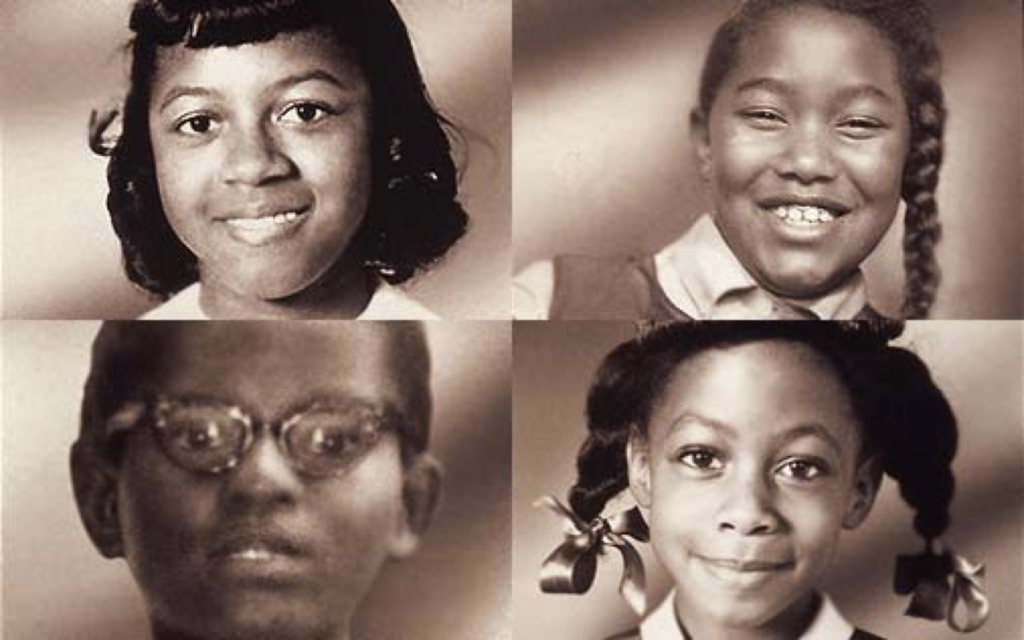
Say their names:
Addie Mae Collins, 14
Denise McNair, 11
Carole Robertson, 14
Cynthia Wesley, 14
On September 15, 1963, a bomb explodes during Sunday morning services in the 16th Street Baptist Church in Birmingham, Alabama, killing those four young girls.
The horrific incident was a made into a documentary film by Spike Lee, which will be preserved in the Library of Congress due to it's "importance to American cinema and the nation’s cultural and historical heritage."
With its large African-American congregation, the 16th Street Baptist Church served as a meeting place for civil rights leaders like Martin Luther King, Jr., who once called Birmingham a “symbol of hardcore resistance to integration.” Alabama’s governor, George Wallace, made preserving racial segregation one of the central goals of his administration, and Birmingham had one of the most violent and lawless chapters of the Ku Klux Klan.
The church bombing was the third in Birmingham in 11 days after a federal order came down to integrate Alabama’s school system. Fifteen sticks of dynamite were planted in the church basement, underneath what turned out to be the girls’ restroom. The bomb detonated at 10:19 a.m., killing Cynthia Wesley, Carole Robertson and Addie Mae Collins–all 14 years old–and 11-year-old Denise McNair. Immediately after the blast, church members wandered dazed and bloodied, covered with white powder and broken stained glass, before starting to dig in the rubble to search for survivors. More than 20 other members of the congregation were injured in the blast.
When thousands of angry black protesters assembled at the crime scene, Wallace sent hundreds of police and state troopers to the area to break up the crowd. Two young black men were killed that night, one by police and another by racist thugs. Meanwhile, public outrage over the bombing continued to grow, drawing international attention to Birmingham. At a funeral for three of the girls (one’s family preferred a separate, private service), King addressed more than 8,000 mourners.
A well-known Klan member, Robert Chambliss, was charged with murder and with buying 122 sticks of dynamite. In October 1963, Chambliss was cleared of the murder charge and received a six-month jail sentence and a $100 fine for the dynamite. Although a subsequent FBI investigation identified three other men–Bobby Frank Cherry, Herman Cash and Thomas E. Blanton, Jr.–as having helped Chambliss commit the crime, it was later revealed that FBI chairman J. Edgar Hoover blocked their prosecution and shut down the investigation without filing charges in 1968. After Alabama Attorney General Bill Baxley reopened the case, Chambliss was convicted in 1977 and sentenced to life in prison.

Here's a timeline of all the events surrounding the bombing:
September 15, 1963 - Four girls are killed and 14 injured in a bomb blast at the Sixteenth Street Baptist Church in Birmingham, Alabama.
- Riots break out, and two African-American boys, Virgil Ware, 13, and Johnny Robinson, 16, are also killed. In all, at least 20 people are injured from the initial bombing and the ensuing riots.
- Alabama Governor George Wallace sends 500 National Guardsmen and 300 state troopers to the city. The next day, they are joined by 500 police officers and 150 sheriffs' deputies.
September 16, 1963 - President John F. Kennedy responds by saying, "If these cruel and tragic events can only awaken that city and state - if they can only awaken this entire nation to a realization of the folly of racial injustice and hatred and violence, then it is not too late for all concerned to unite in steps toward peaceful progress before more lives are lost."
September 16, 1963 - Dr. Martin Luther King Jr. holds a press conference in Birmingham, saying that the US Army "ought to come to Birmingham and take over this city and run it."
1965 - Suspects emerge: Bobby Frank Cherry, Thomas Blanton, Robert Chambliss and Herman Frank Cash, all Ku Klux Klan members. Witnesses are reluctant to talk and physical evidence is lacking, so charges are not filed.
1976 - Alabama Attorney General Bill Baxley reopens the case.
(timeline continues on next page)
September 26, 1977 - Robert Chambliss, 73, a retired auto mechanic and former Ku Klux Klan member, is indicted by a Jefferson County grand jury on four counts of first-degree murder.
November 15, 1977 - On the second day of the trial, Chambliss's niece, Elizabeth Cobb, testifies that before the bombing, Chambliss confided to her that he had "enough stuff put away to flatten half of Birmingham."
November 18, 1977 - Chambliss is convicted of first-degree murder in connection with the bombing and sentenced to life imprisonment.
1985 - Chambliss dies in prison.
1994 - Herman Frank Cash dies without being charged in the bombing.
July 1997 - The case is reopened by the FBI, citing new evidence.
May 16, 2000 - A grand jury in Alabama indicts former Klansmen Bobby Frank Cherry and Thomas Blanton with eight counts each of first-degree murder - four counts of intentional murder and four of murder with universal malice.
May 1, 2001 - Thomas Blanton is found guilty of first-degree murder and is sentenced to four life terms.
May 22, 2002 - Bobby Frank Cherry is found guilty and given a sentence of four life terms.
November 8, 2004 - Cherry dies in prison.
February 20, 2006 - The Sixteenth Street Baptist Church is declared a national historic landmark.
September 12, 2013 - Fifty years after the bombing, all four girls who died are awarded Congressional Gold Medals.
September 14, 2013 - A bronze and steel statue of the four girls is unveiled. It is located at Kelly Ingram Park, on the corner of Sixteenth Street North and Sixth Avenue North.
August 3, 2016 - Thomas Blanton, the last living convicted bomber, is denied parole. Blanton, 86, had asked the Alabama Board of Pardons and Paroles to let him die as a free man. He won't be eligible for parole again until 2021.
December 13, 2017 - Democrat Doug Jones, who prosecuted two of the Ku Klux Klan members responsible for the attack was on the ballot against Republicans accused of pedophilia, Roy Jones. On December 13, 2017, Alabama voters elected Jones to the U.S. Senate, in a surprise victory.
2020 - We remember them and will never forget our four precious little girls.









